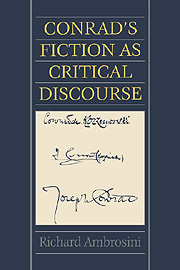Book contents
- Frontmatter
- Contents
- Acknowledgments
- List of abbreviations
- Introduction
- 1 The critical discourse: five tropes
- 2 Working on language and structure: alternative strategies in The Nigger of the “Narcissus” “Karain” and “Youth”
- 3 The mirror effect in “Heart of Darkness”
- 4 Lord Jim (I): the narrator as interpreter
- 5 Lord Jim (II): the narrator as reader
- Postscript
- Notes
- Bibliography
- Index
Introduction
Published online by Cambridge University Press: 05 January 2012
- Frontmatter
- Contents
- Acknowledgments
- List of abbreviations
- Introduction
- 1 The critical discourse: five tropes
- 2 Working on language and structure: alternative strategies in The Nigger of the “Narcissus” “Karain” and “Youth”
- 3 The mirror effect in “Heart of Darkness”
- 4 Lord Jim (I): the narrator as interpreter
- 5 Lord Jim (II): the narrator as reader
- Postscript
- Notes
- Bibliography
- Index
Summary
The re-evaluation of Joseph Conrad's work in the second half of this century has uncovered in his texts complex narrational forms and startling perceptions of the darkness in Western consciousness. That scholarly enterprise has discarded, apparently for good, several simplistic labels that earlier, less-refined approaches had attached to his fiction. Conrad's admission to the modernist pantheon, however, has not substantially redefined the earlier casting of the writer as a mature sailor who had spent his formative years in a world foreign to literary circles. The very assumptions which have made possible Conrad's re-evaluation are largely grounded on the notion that the valuable parts of his texts have to be rescued from their author's tampering with the product of his creative imagination. As a result, the comments he makes about his own art in his fiction, letters and essays are dismissed as perfunctory self-defenses. According to Douglas Hewitt, for example, Conrad seems to be “unaware of what qualities make him a great novelist.” Reasoning along these lines, critics have felt that in assessing Conrad's greatness they were formulating for the first time the theoretical implications of his artistic choices.
In the long run, however, the assumptions which have guided Conrad's reassessment have actually impeded understanding of the complexity of his work. The dismissal of the theoretical relevance of Conrad's comments about his work has frustrated the kind of discussion by which other modernist writers have gained considerably.
- Type
- Chapter
- Information
- Conrad's Fiction as Critical Discourse , pp. xv - xxxPublisher: Cambridge University PressPrint publication year: 1991



